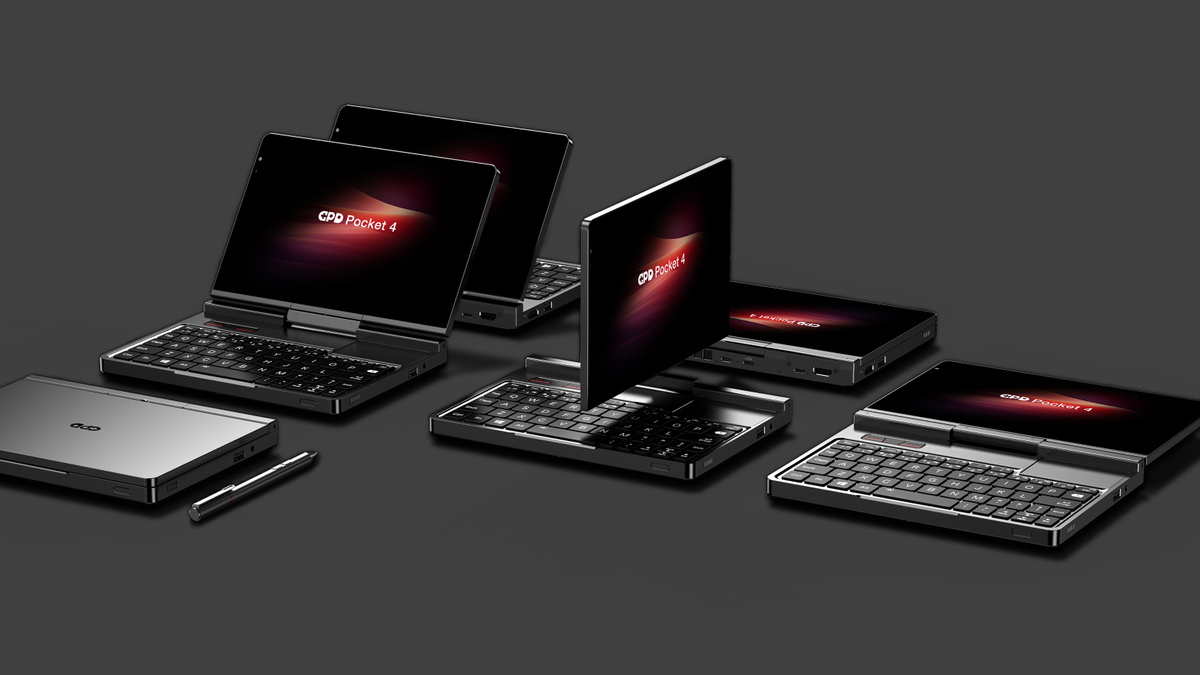Earlier today, the product page for the upcoming GPD Pocket 4 handheld/tablet/mini laptop went live on GPD’s website. The product page reveals a full set of system specifications and a fairly expansive list of optional expansions and potential use cases, focusing on creativity and productivity.
While the gaming utility is somewhat understated, the Pocket 4’s status as the first Ryzen AI 9 HX 370 handheld, physical keyboard, multi-touch interfaces, and motion controls should all have it fairly equipped for those scenarios, too. Steam Input used with a device with this power and this range of utility shows some promise despite gaming not being the focus of the form factor.
Of the four expansion modules listed on the original product page to be slotted in with the module system, only the microSD card Reader Module is actually included with the device. The other three listed Modules (EIA RS-232 Module intended for use in Terminal Display use cases; KVM Control Module intended for use in data center/server and multi-PC use cases; 4G LTE Module self-explanatory) are all separate purchases.
GPD Pocket 4 Specifications
| Product Name | GPD Pocket 4 |
|---|---|
| CPU | AMD Ryzen AI 9 HX 370, using Zen 5 Strix Point architecture and 12 cores/24 threads |
| GPU | Integrated Radeon 890M iGPU with 16 RDNA 3.5 Compute Units running up to 2900 MHz |
| RAM | 34 GB and 64 GB configs at 7500 MT/s |
| Storage | 1 Replacable Single-Sided NVMe M.2-2280 Gen 4 Drive, 2 or 4 TB capacity configs |
| Display Panel Type and Color Gamut | LTPS 10-Point Multi-Touch 144 Hz Panel with estimated 97% DCI-P3 color gamut coverage |
| Display Resolution and PPI (Pixels Per Inch) | 2560 x 1600 (16:10) at 8.8 inches and 343 PPI |
| Display Brightness | 500 nits |
| Core I/O | 1 Type-C USB4 40Gbps port*; 1 Type-C USB 3.2 10Gbps port*, 1 Type-A USB 3.2 Gen2 port, 1 Type-A USB 2.0 port, 1 HDMI 2.1 out port, 1 3.5mm audio port, 1 RJ45 Ethernet port (2.5 Gigabits) |
| Wireless Technology | Wi-Fi 6E with 2×2 Dual Band antennas, Bluetooth 5.3 |
| Special Features | 3-Axis Accelerometer; Capacitive Stylus (4096 pressure levels) Support; Expansion Modules including a 4G LTE Module, a Memory Card Reader Module, a KVM Module, and an EIA RSR-232 Module |
*Both these USB-C ports support USB power delivery.
At this point, all that’s missing is an OCuLink eGPU Module, though GPD touts the Pocket 4’s support for USB4 eGPU docks as an intended use case. However, OcuLink is still faster, so if these Expansion Modules use enough PCIe lanes, there could be more potential.
While the general CPU and iGPU specs are quite impressive, one important caveat is worth noting. This PC can only run its Ryzen AI 9 HX 370 at up to 28 Watts, the default TDP of a CPU that can otherwise be configured to use a 54-watt TDP.
Such a TDP tweak on this handheld is intended. However, a higher TDP could result in dramatically fast battery depletion or overheating, which isn’t ideal for its intended handheld enthusiasts or tech professional environments. It also means that the true GTX 1070-esque highs of the new top dog iGPU, the Radeon 890M, aren’t quite explorable on this device.
That said, the most impressive aspect of the GPD Pocket 4 was never its hardware power— the sheer versatility of input and use case potential is staggering. All that on top of an 8.8-inch multi-touch tablet display with 97% DCI-P3 coverage and ICC calibration support, and the Pocket 4 looks to be an enticing offer— but no word is yet available on pricing or release date, and the usage of 45W TDP Ryzen AI 9 HX 370 benchmarks on the Pocket 4’s page is misleading of GPD.










